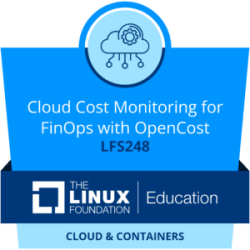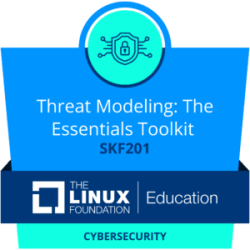Images
The training included starts with containers and Kubernetes fundamentals, moving to system monitoring, cloud native logging, and Kubernetes application management, providing all the knowledge needed to work as a cloud administrator.
WEEK 1-4 Containers Fundamentals (LFS253)
In our app-driven world, containers and microservices are the perfect home for an application. This course will help you build a solid foundation for container technologies.
WEEK 5-9 Kubernetes Fundamentals (LFS258)
This course will teach you how to install and configure a production-grade Kubernetes cluster, from network configuration to upgrades to making deployments available via services.
WEEK 10 Certified Kubernetes Administrator Exam (CKA)
Earning your CKA will demonstrate you have the skills, knowledge, and competency to perform the responsibilities of a Kubernetes administrator and cloud engineer.
WEEK 11-15 Service Mesh Fundamentals (LFS243)
With the growth of microservices and Kubernetes, production environments need to have tools to monitor and manage network traffic. This course explores the use of Envoy Proxy and Istio to take control of network access. (Course launching July 31, 2020)
WEEK 16-19 Monitoring Systems and Services with Prometheus (LFS241)
Prometheus is a monitoring system and time series database that is especially well suited for monitoring dynamic cloud environments. This course walks through installation and deployment, many of its major features, best practices, and use cases.
WEEK 20-23 Cloud Native Logging with Fluentd and Fluent Bit (LFS242)
This course introduces the Fluentd and Fluent Bit log forwarding and aggregation tool for use in cloud native logging. Both tools provide fast and efficient log transformation and enrichment, as well as aggregation and forwarding. These capabilities enable both Fluentd and Fluent Bit to realize the concept of a “unified logging layer”, that helps users consume log data collected from all parts of a large scale, distributed system.
WEEK 24-26 Managing Kubernetes Applications with Helm (LFS244)
Deploying complex and interrelated microservices can be challenging. The course explains how to use Helm to package, install, and verify Kubernetes components in a production cluster.
Similar resources
The key to a successful open technology project is to ensure a neutral playing field for all developers, technologists, and companies to collectively contribute to project evolution and growth. The Linux Foundation was built on the idea of the democratization of code and scaling adoption, for all projects equally. Expert legal and governance support programs ensure everyone is on the same playing field.


Cloud Cost Monitoring for FinOps with OpenCost (LFS248)

Conversational AI: Ensuring Compliance and Mitigating Risks (LFS120)

WebAssembly Components: From Cloud to Edge (LFD134)

Threat Modeling: The Essentials Toolkit (SKF201)

Besu Essentials: Creating a Private Blockchain Network (LFS176x)












